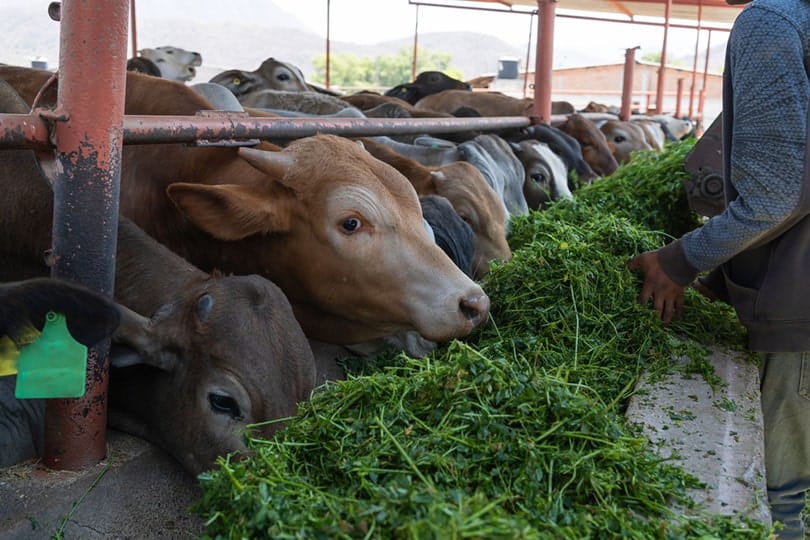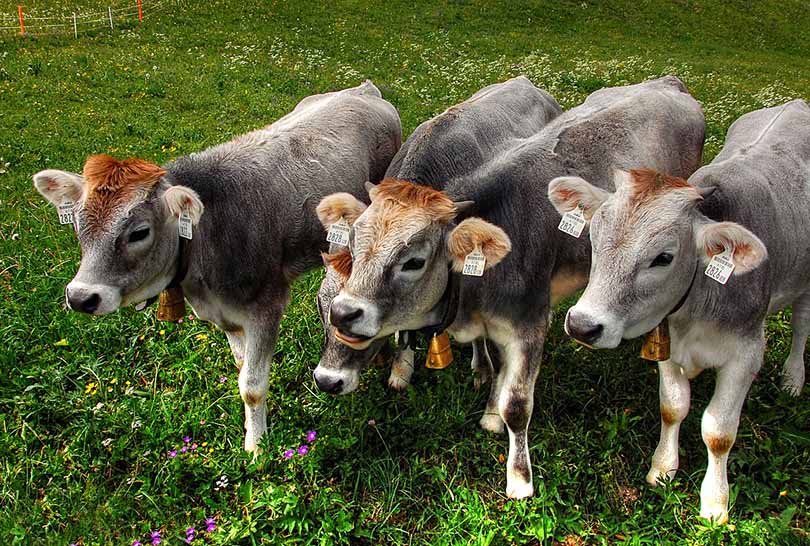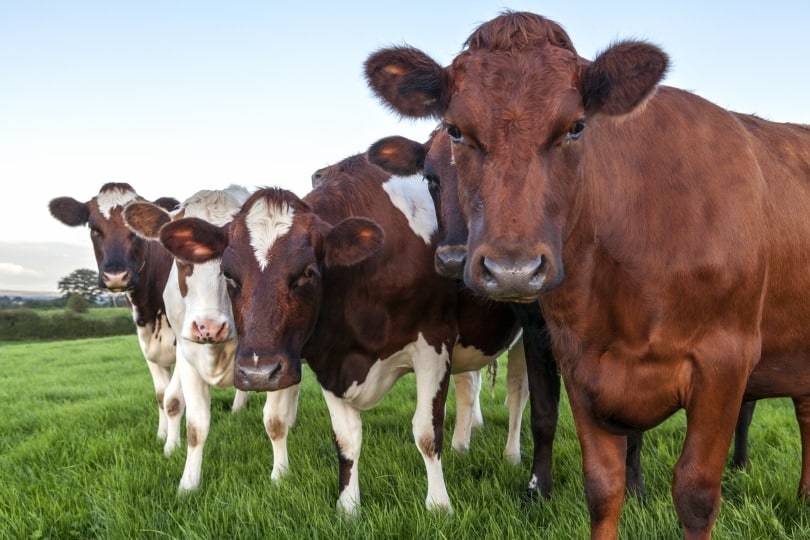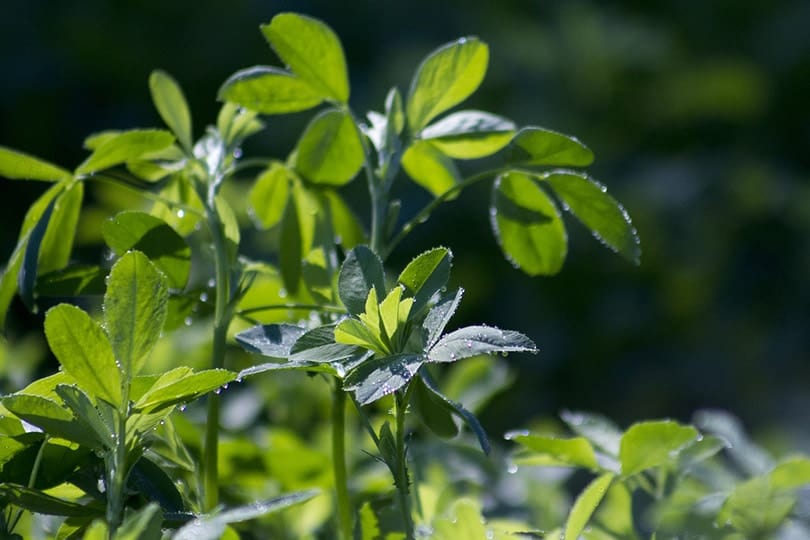Alfalfa is considered to be great food for many cows. It can even exceed a cow’s nutritional needs. For this reason, it can be used as either a harvested feed or a grazing option for beef and milk cows.
It is incredibly high in protein at around 20%, which is higher than most other feeds. Grass hays are often low in protein, making alfalfa an excellent supplemental option to improve a cow’s protein intake. Regular grass hay also takes longer to digest than alfalfa.
If a cow is provided with alfalfa, they tend to eat more. This can lead to bigger cows that produce more milk. A well-fed cow is also a healthier cow, so these animals tend to be in better condition overall, with a lower mortality rate.

Feeding Alfalfa to Beef Cows
Alfalfa and grass hay can be utilized together to produce outstanding beef cows. If your beef cows eat mostly low-quality grass hay, alfalfa can be added as a supplement to improve the cow’s overall nutritional intake.
A small amount of alfalfa is often needed to offset the nutritional issues that low-quality grass can sometimes create. Therefore, feeding mature or weather-damaged hay with some alfalfa is a solid, cost-effective strategy.
Alfalfa consumption will cause the cow to eat more because it digests quickly. For this reason, you can expect these cows to gain more weight, which in turn, leads to more beef.

Alfalfa for Grazing
While many people may want to control the exact amount of alfalfa that is consumed by their cows, it can also be used for grazing purposes. Cows that graze on alfalfa are more likely to gain weight in even hot and dry conditions.
Rotational feeding is best with alfalfa because you want it to reach the proper stage of maturity before allowing the cow to eat it. The grass should be in early bloom. If it gets too mature before the cows eat it all, they can be moved to a younger patch and the excess cut for later consumption.
Stocking rates are typically high with alfalfa because it is more energy-dense than other grasses. You will need to adjust it for your current conditions. Muddy fields should have a lower stocking rate to prevent the field from being ruined (or preferably, the cows should be placed in a “sacrificial” field instead).
Alfalfa for Calves
Alfalfa is particularly good for calves because they need the extra protein to grow quickly and large. It is best to pair alfalfa with another feed like clover, though, which will give calves all the nutrients and calories that they need to grow properly.
Alfalfa can also last a long time with calves, so you don’t need to replant it often.
For weaned calves, alfalfa and corn can be suitable grazing foods. You can provide cattle with a mixed grazing field and feed them corn as a supplement, or you can feed calves a mixture of corn and dried alfalfa.
Alfalfa often leads to excellent gains for calves. It also produces healthier animals overall because well-maintained calves are less likely to get sick in the first place.

Bloat and Alfalfa
While alfalfa is widely considered one of the more nutritious feeds that you can provide a cow, it can also cause pasture bloat. You shouldn’t let this condition scare you, though, as alfalfa has the potential to nearly double the income of most farms. You just have to use it carefully. You can’t simply throw your cattle into an alfalfa field and expect them to gain tons of weight.
Typically, you can limit the chance of bloat by mixing the alfalfa with other feed, such as legumes. Wilting the alfalfa before feeding it to the cow has also been shown to help reduce bloat.
You will want to wait until its full bloom to feed alfalfa to your cattle. Alfalfa in early bloom can have more soluble protein and thinner cell walls, which makes it easier to digest, but these factors can also increase the chance of bloat. Generally, anything that reduces the soluble protein found in alfalfa can lower the overall bloat risk.
Managing the cattle properly can also reduce the risk. Starving animals should never be given alfalfa, as they will consume too much of it too quickly. Other factors, like scorching weather and interrupted grazing, can also increase the chance of bloat.
That said, nothing will eliminate bloat risk ultimately. All animals should be monitored to ensure that bloat does not occur and that treatment can be provided if it does.

FAQs
Can Grass-Fed Beef Cows Eat Alfalfa?
It is a common misconception that beef cows cannot eat alfalfa. However, the extra protein in this feed is helpful for beef cows in particular, which is precisely why it is recommended. While you do have to be cautious due to the increased chance of bloat, when properly managed, this grass can seriously improve weight gain in beef cattle. It can be fed to beef steers and calves, improving the weight and condition of both.
For this reason, alfalfa is often considered one of the best feeds that you can provide for grass-fed cattle.
Does Alfalfa Poison Cows?
Alfalfa by itself is not poisonous, but it is high in soluble protein, which is linked to a higher chance of bloat. However, there are several things that you can do to prevent bloat in cattle. Some of these have to do with the plant itself, such as waiting until the alfalfa is mature or mixing it with other feed to prevent overconsumption.
Managing the cattle is also essential. Overly hungry cows will overeat alfalfa, which can cause bloat. If you rotate cattle between fields, be sure they are not extremely hungry before moving them to a new field with alfalfa.
Poisonous plants can also get mixed in with alfalfa, which can hurt your cattle.
How Much Alfalfa Can a Cow Eat?
It is best to limit consumption to 5 pounds a day. You don’t want them to overeat alfalfa because this may cause bloat. At 5 pounds a day, you can meet your cattle’s nutritional needs for a low cost because alfalfa is quite digestible and contains a large amount of protein.


Conclusion
Alfalfa is a bit controversial in the cattle world. On the one hand, this feed leads to improved weight gain in cows of all ages. It provides extra protein and is highly digestible. It also enables you to meet your cattle’s nutritional needs for much cheaper than some other options. For this reason, it can also help the average farmer make plenty of money.
However, alfalfa can be dangerous if not used cautiously. The high amount of soluble protein can cause bloat. Therefore, you have to feed your cattle only a small amount of alfalfa, preferably mixed with Johnson’s clover or corn.
Featured Image Credit: jmklatte, Pixabay
